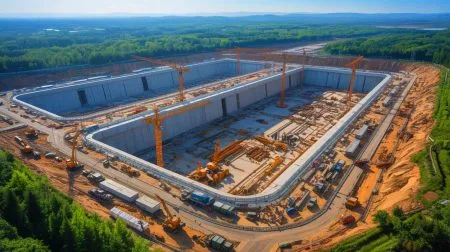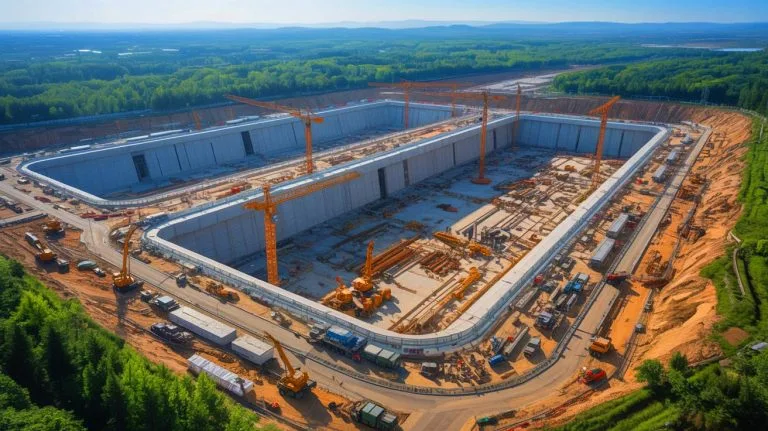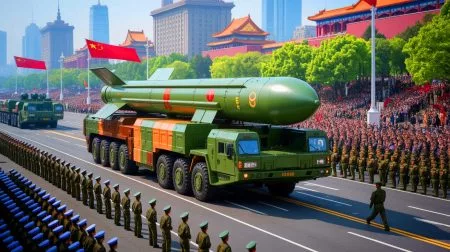| IN A NUTSHELL |
|
In the fast-paced arena of global geopolitics, China’s latest military venture has captured significant worldwide attention. Recent satellite imagery has unveiled the construction of a vast underground military command center near Beijing. This ambitious project underscores China’s strategic intentions to rival the United States and shift the global balance of power. Experts and observers are closely monitoring these developments, as the implications for both regional and international security dynamics are profound. As tensions continue to rise in Asia, understanding the motivations and potential impact of this military endeavor is critical for comprehending future geopolitical landscapes.
China’s Ambitious Military Vision
China’s ongoing military project serves as a testament to its expansive strategic vision. This initiative is reminiscent of Cold War-era military strategies, where the focus was on underground shelters capable of withstanding formidable threats. Since the 1980s, China has been cultivating specialized teams dedicated to constructing such bunkers, drawing inspiration from nations like the Soviet Union and Germany. Today, China is elevating this concept to new heights by constructing what may become the world’s largest underground military command center.
The sheer scale of this project highlights China’s determination to safeguard its military assets against potential threats. With geopolitical tensions escalating, particularly in Asia, this development underscores China’s commitment to strengthening its defense infrastructure. The project also reflects the evolving nature of military strategies in the modern era, where technological advancements and strategic positioning are central to national security. By investing in such substantial infrastructure, China is signaling its intent to play a dominant role on the global stage.
Implications for Global Security
The construction of China’s underground military complex carries significant implications for global security. As China expands its military capabilities, neighboring countries and global powers are reassessing their security strategies. This development is not just about enhancing military might; it represents a shift in the balance of power in Asia and beyond. The strategic importance of this project cannot be overstated, as it has the potential to alter military alliances and defense strategies worldwide.
China’s actions may provoke reactions from other major powers, potentially igniting an arms race similar to that of the Cold War. The United States, in particular, may feel pressured to increase its military presence in the region to counterbalance China’s growing influence. This possibility raises critical questions about the future of international relations and the potential for conflict or cooperation in addressing shared security challenges. The unfolding scenario presents both opportunities and risks for global stability.
Technological Sophistication and Strategic Depth
The core of China’s military project is its focus on technological sophistication and strategic depth. The underground command center is expected to feature advanced technologies, including state-of-the-art communication systems and cutting-edge defense mechanisms. This technological prowess is indicative of China’s broader ambitions to emerge as a leading military power, capable of challenging the technological advancements of the United States and other global military giants.
The strategic depth of this project also underscores China’s long-term vision for its defense strategy. By investing in subterranean infrastructure, China ensures the resilience and sustainability of its military capabilities. This approach not only protects its assets from conventional threats but also positions China as a formidable force in potential future conflicts. As such, this development marks a new chapter in China’s military history, characterized by innovation and strategic foresight. It is a clear signal of China’s determination to secure its standing as a global power.
Regional Reactions and Future Prospects
The unveiling of China’s underground military complex has elicited varied reactions across the region. Neighboring countries are closely monitoring the situation, with some expressing concern over the potential implications for regional stability. Others are considering strategic partnerships and alliances to counterbalance China’s growing military influence. This development has undoubtedly prompted a reevaluation of defense strategies across Asia, as nations seek to navigate the shifting geopolitical landscape.
Looking ahead, the future prospects of this project will depend on China’s ability to manage its regional relationships and address the concerns of the international community. The success of this endeavor could redefine China’s role on the global stage, potentially paving the way for new alliances and diplomatic engagements. However, it also raises important questions about the potential for conflict and cooperation in a world increasingly defined by military prowess and strategic competition. As the world watches China’s military ambitions unfold, how will other nations respond to this growing might? Will this development lead to increased cooperation or heightened tensions among global powers?
Did you like it? 4.3/5 (27)








Wow, that’s some next-level stuff! Hope it doesn’t start another arms race. 🤞
Wow, this is some serious James Bond stuff! 🕵️♂️
Why does China need such a large underground facility? 🤔
Why are they building it underground? Are they expecting an attack?